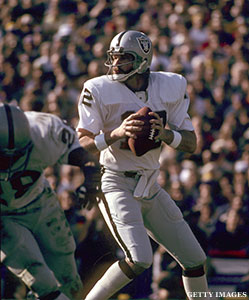
The exact details are lost to history, but it probably went like this:
Six dudes, all in their mid-20s, are sitting in a suburban basement. Wood paneling on the walls, shag carpet on the floor, six cans of Stroh's on six coasters. One guy is leafing through last week's Sports Illustrated, the issue with Greg Luzinski on the cover. Another is staring at a list of names on a legal pad.
"C'mon," says a guy in a BTO concert shirt. "You gotta pick somebody."
"Just a sec."
He sips his beer, he scans his list, he runs a hand through his feathered hair.
"OK, I got it." He looks up. "I'm taking Kenny Stabler."
And with that selection, a six-man fantasy draft was underway. It was early September, 1977.
"That was Walter Payton's third year and Tony Dorsett's rookie year," says Paul Goodman, a 60-year-old attorney and founding member of what might be the world's oldest ongoing fantasy football league. "And I had both of them on my team."
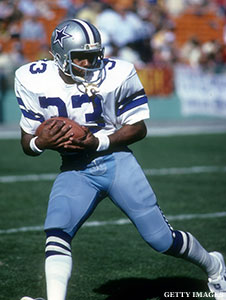
Goodman says this with evident satisfaction, as if it were 34 years ago he'd just clinched his first championship. Payton and Dorsett finished first and second in the NFL rushing TDs in '77, so you can understand why Paul still takes an occasional victory lap.
To be clear, Goodman and his five original league-mates didn't invent fantasy sports -- although they were playing two full years before Daniel Okrent and friends pioneered roto-style baseball -- but they were clearly in on the ground floor. It's generally accepted that fantasy football originated in Oakland in the early 1960s, with a game devised by Raiders limited partner Bill Winkenbach, team public relations man Bill Tunnell and Oakland Tribune writer Scotty Stirling. (First pick in the first draft: George Blanda). The concept did not exactly spread in viral fashion, but it persisted, eventually creeping toward the Midwest.
"One of the guys in our league, Rand Brichta, who's been with us the whole time, he had heard of something like this," explains Goodman, the de facto commissioner. "It was either through work or through a friend. He said, 'Hey, this is a great idea. We've got to do this.' The first year we had six guys. The second year we moved it up to nine, and then we've had 11 or 12 every other year."
Five of the original six owners were college friends, fraternity brothers at the University of Illinois, and the sixth was Goodman's business partner. All but one of the founding members remains involved in the league. For their first 20-plus years, the scoring system was points-only: TDs and field goals, nothing else. Yardage was irrelevant.
"Our scoring didn't change until recently, in the 2000s," says Goodman. "The reason we didn't want to change it is that we kept score ourselves, from newspaper box scores. We took turns."
As you might have guessed from the sometimes odd number of owners, this group has never adopted the weekly head-to-head format favored by most fantasy leagues.
"No, we don't play head-to-head," says Goodman, with clear disdain for standard settings. "We play weekly prize for the highest scorer, then high-score for the year. In these head-to-head leagues, it's almost random who wins."
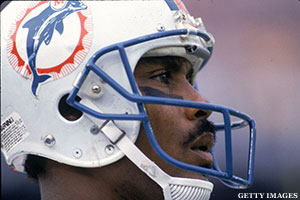
In Goodman's league, there's little room for randomness. Who's won the most titles?
"I have," he says. "By far. Ten of the first 12." By his count, Goodman has actually claimed the league championship 19 times.
"But only nine of the last 22," he adds, almost disgusted. This man is probably the winningest single-league owner in the history of fantasy sports, yet he apparently feels as much like a 15-time loser as a 19-time winner. The sweetest title for Goodman might be his first, back when the league only went half-a-dozen teams deep, and the NFL schedule lasted just 14 weeks.
"Basically back then, you had to have a good quarterback to win," he says. "Passing touchdowns scored the same as rushing. I can tell you the first round of the draft exactly, I think. Stabler was picked first, then Bert Jones. Then Roger Staubach. [Ken] Anderson was the fourth pick. Fifth pick was some running back, probably Franco [Harris]. And the last pick of the first round was Jim Zorn."
Goodman snagged Payton near the top, and then Dorsett fell to the middle-rounds. Even then, a rookie bias existed in fantasy. "I got Dorsett in the seventh or the eighth, because it was his first season. He wasn't even starting. Preston Pearson was the starter, I think."
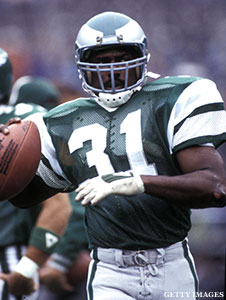
But Dorsett wasn't the draft's filthiest steal.
"The funny thing is," says Goodman, "I drafted my quarterback – I drafted Ken Anderson in the first round -- and then I wound up using him for only about three or four weeks. My last pick in the draft was Bob Griese, and he had an unbelievable year, out of nowhere."
Griese led the NFL in passing touchdowns that season. He was also the essential player in the highest-scoring week in the history of Goodman's fantasy league, under the original rules. In league lore, the record-setter is simply known as "The Nat Moore Game."
"I think that was Thanksgiving, that first year," says Goodman. "Griese threw for six touchdowns, three of them to Moore, another of my starters."
The box score from November 24, 1977 confirms the details: Griese went 15-for-23, passing for 207 yards and six scores in a 55-14 mauling of the St. Louis Cardinals. Moore caught seven balls, crossing the goal line from 4, 9 and 28 yards. On that same Thanksgiving Day, in the greatest season of his Hall of Fame career, Payton found the end zone twice at Detroit, gaining 244 scrimmage yards. Dorsett would add another score on Sunday. The only member of Goodman's active roster who was shut out that week was Oakland tight end Dave Casper.
It's incredible that a fantasy scoring record from '77 would endure so long, because that was an era in which stats were scarce and hard-earned. Any penalty on a defensive back essentially required an assault. Griese's league-leading touchdown total was 22; Joe Ferguson led the NFL in passing yards with 2,803. This season, through three weeks, Tom Brady is already halfway to 22 TDs. At his current pace, Brady will pass 2,800 yards in Week 8.
You might think a 35-year fantasy veteran like Goodman would view the NFL's passing explosion as the game's greatest seismic shift, but no.
"The reason I won those early years is that I knew where to go to get information," he says. "My wife worked for Pro Football Weekly, so I used to hang around there to get the information. I was always coming up with guys like [Eagles running back] Wilbert Montgomery, who came out of nowhere. Or Sherman Smith on Seattle.
"But now you can't do that. Now everybody's got the same information. I'm not smarter than everybody, but I knew where to go."
But still, nine titles over the past 22 years is hardly an embarrassment.
"Frankly," says Goodman, "I might be a little more interested in football than most of the guys."
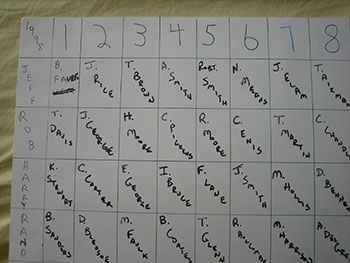
-- Sign up today for Yahoo! Fantasy Football.




